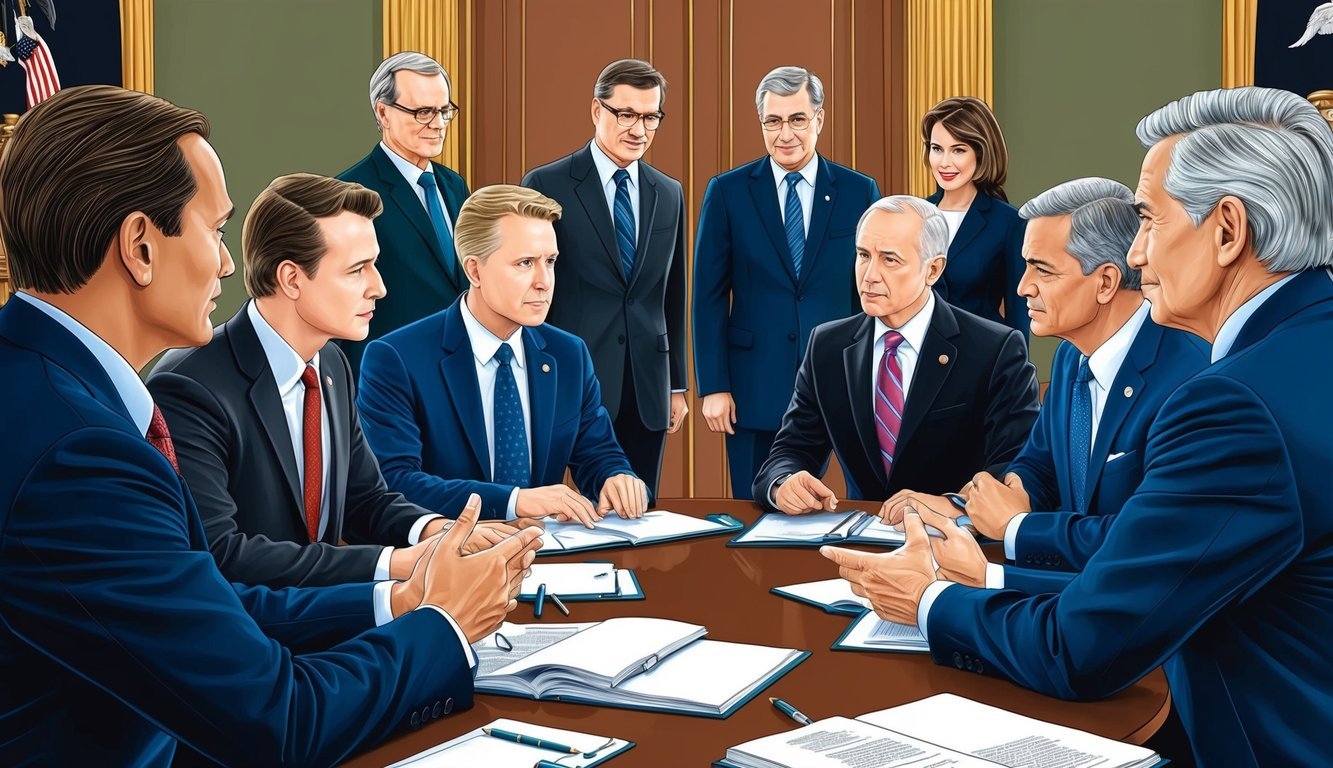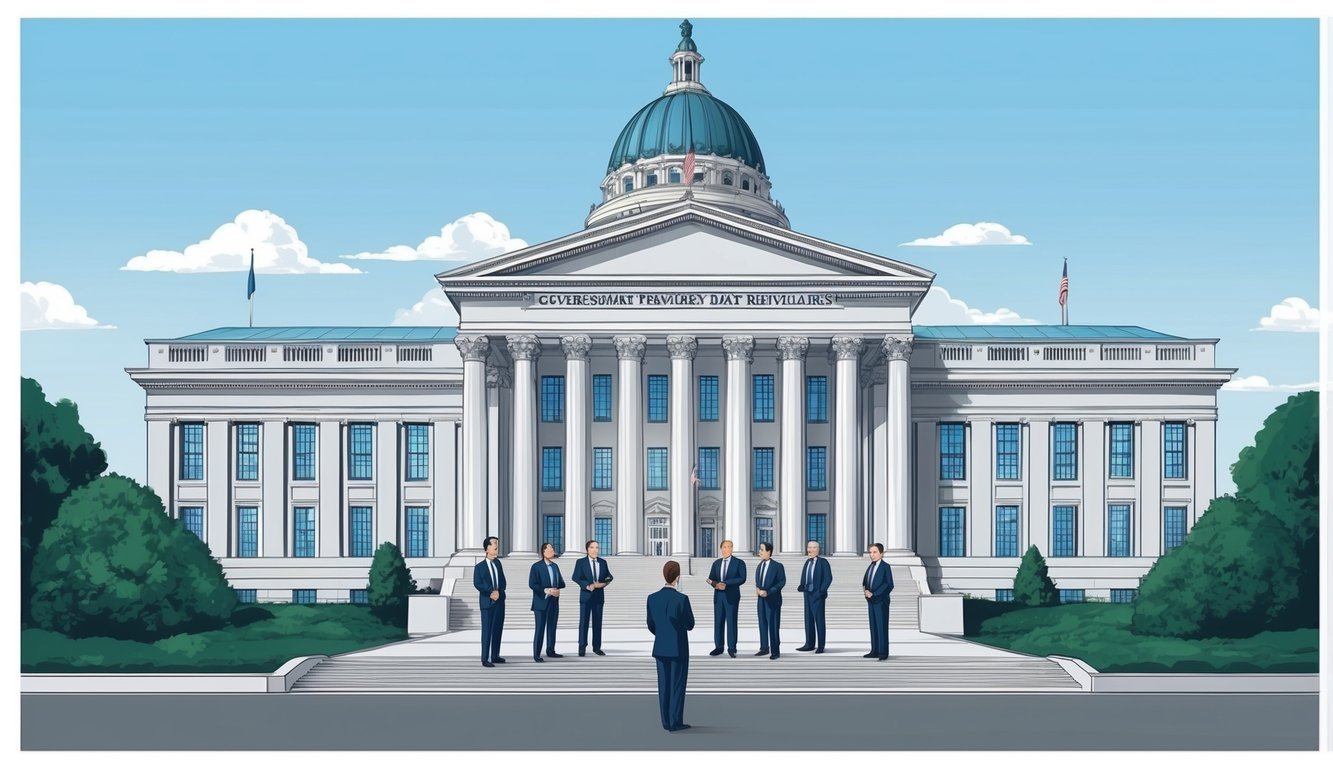Government Relations Practice is a crucial aspect of modern business and organizational management. It involves building and maintaining relationships with governmental bodies to influence policy decisions and navigate regulatory landscapes. Effective government relations can significantly impact an organization’s success, shaping its operating environment and strategic opportunities.
Organizations engage in government relations to ensure their interests are represented in policy-making processes. This practice encompasses a range of activities, from monitoring legislative developments to directly advocating for specific policies.
It requires a deep understanding of political systems, regulatory frameworks, and the art of strategic communication.
Professionals in this field must balance ethical considerations with organizational objectives. They need to stay informed about political trends, build networks with key decision-makers, and develop strategies to engage effectively with government entities.
The practice of government relations is dynamic, requiring adaptability and continuous learning to navigate the ever-changing political landscape.
Key Takeaways
- Government relations involves strategic interactions between organizations and government entities to influence policy and regulatory decisions
- Effective government relations practices require a deep understanding of political systems and strong communication skills
- Ethical considerations and regulatory compliance are crucial elements in successful government relations strategies
Understanding Government Relations
Government relations practices shape interactions between organizations and public institutions. These efforts influence policy decisions and legislative outcomes.
Definition and Scope
Government relations encompass strategies and activities that organizations use to engage with government entities. This practice involves communicating with policymakers, tracking legislation, and advocating for specific interests.
You’ll find government relations professionals working in various sectors, including corporations, non-profit organizations, and trade associations. Their roles often involve:
• Monitoring policy developments
• Building relationships with elected officials
• Providing expert testimony at hearings
• Drafting position papers on key issues
The scope of government relations extends to all levels of government—local, state, and federal. It requires a deep understanding of political processes and the ability to navigate complex regulatory environments.
Importance in Public Policy
Government relations play a crucial role in shaping public policy. You can see its impact in various ways:
- Informing decision-makers: Organizations provide valuable insights and data to policymakers.
- Representing stakeholder interests: Advocacy efforts ensure diverse viewpoints are considered.
- Facilitating dialogue: Government relations professionals bridge the gap between public and private sectors.
Effective government relations can lead to more informed policy decisions. By engaging with policymakers, you help ensure that legislation considers real-world implications and stakeholder needs.
This practice also promotes transparency in governance. It allows you to voice concerns and propose solutions to policy challenges, contributing to a more participatory democratic process.
Regulatory Framework
The regulatory framework governing government relations practice encompasses crucial areas of compliance, legislation, ethics, and campaign finance. Understanding these elements is essential for navigating the complex landscape of political engagement and advocacy.
Compliance and Legislation
Compliance with relevant laws and regulations is paramount in government relations practice. You must stay informed about current legislative frameworks that impact your activities. This includes registration requirements for lobbyists and reporting obligations for political contributions.
Key legislation to be aware of:
- Lobbying Disclosure Act
- Foreign Agents Registration Act
- Federal Election Campaign Act
You should establish internal processes to ensure ongoing compliance. Regular audits and staff training are essential to maintain adherence to evolving regulations.
Government Ethics and Campaign Finance
Adhering to ethical standards and campaign finance regulations is crucial for maintaining credibility in government relations. You must understand gift rules, conflict of interest provisions, and restrictions on campaign contributions.
Important considerations:
- Limits on campaign donations
- Disclosure requirements for political activities
- Ethics guidelines for interactions with public officials
Implementing robust internal policies can help you navigate these complex areas. Consider establishing a dedicated ethics committee to review and approve engagement activities.
Strategies in Government Relations

Effective government relations require a well-planned approach and diverse methods of engagement. Developing a comprehensive strategy and employing targeted lobbying techniques are crucial for success in this field.
Developing a Government Relations Strategy
To create an impactful government relations strategy, you need to start by identifying your key objectives. Analyze the political landscape and pinpoint the decision-makers who can influence your goals. Conduct thorough research on relevant policies and regulations.
Build a strong network of contacts within government agencies and interest groups. Cultivate relationships with policymakers and their staff members. These connections can provide valuable insights and opportunities for collaboration.
Craft clear and compelling messages that resonate with your target audience. Develop a communication plan that outlines how you’ll convey your positions to various stakeholders.
Lobbying and Advocacy Methods
Lobbying is a key component of government relations. You can engage in direct lobbying by meeting with legislators or their staff to discuss specific issues. Prepare concise briefing materials that highlight your main points and support them with data.
Grassroots advocacy can be highly effective. Mobilize supporters to contact their representatives through letters, emails, or phone calls. Organize events or rallies to draw attention to your cause and demonstrate public support.
Utilize media relations to amplify your message. Write op-eds, participate in interviews, and leverage social media to reach a wider audience. Consider forming coalitions with like-minded organizations to increase your influence and resources.
Monitor legislative activities and regulatory developments closely. Be prepared to provide expert testimony at hearings or submit written comments on proposed rules when opportunities arise.
Tools for Government Relations

Effective government relations practitioners utilize specialized tools to navigate the complex legislative landscape and gather crucial political intelligence. These tools enhance decision-making and strategic planning in the field.
Legislative Tracking and Monitoring
Legislative tracking software allows you to stay informed about bills and regulations relevant to your interests. These platforms provide real-time updates on legislative activities, helping you identify potential impacts on your organization.
You can set up customized alerts for specific bills, committees, or keywords. This ensures you never miss critical developments. Many tools offer features like bill text analysis and amendment tracking, allowing you to quickly assess changes and implications.
Some platforms integrate with stakeholder management systems, enabling you to link legislative activities with key decision-makers. This integration enhances your ability to target advocacy efforts effectively.
Political Intelligence and Research
Political intelligence tools help you gather and analyze data on political trends, public opinion, and policy developments. These resources are essential for informing your government relations strategy.
You can leverage opinion formation tools to gauge public sentiment on key issues. This information helps you tailor your messaging and advocacy efforts for maximum impact.
Research databases provide access to policy papers, expert analyses, and historical voting records. By utilizing these resources, you can develop a deeper understanding of complex policy issues and anticipate potential challenges or opportunities.
Social media monitoring tools allow you to track online conversations and identify emerging trends. This real-time insight can help you respond quickly to evolving political situations and adjust your strategies accordingly.
Effective Communication

Effective communication is crucial for successful government relations practice. It involves strategic messaging and engagement with various stakeholders to achieve desired outcomes.
Engaging with Policymakers
When engaging with policymakers, you need to tailor your approach. Present concise, evidence-based information that aligns with their interests and priorities. Use clear, jargon-free language to convey complex ideas.
Develop compelling policy briefs and position papers. These documents should highlight key issues, potential solutions, and expected impacts. Public affairs offices play a crucial role in crafting these materials.
Build relationships through regular meetings and events. This allows you to establish trust and credibility over time. Remember, effective engagement is a long-term process.
Public Relations and Crisis Management
Public relations in government relations requires a nuanced approach. You must balance transparency with discretion, especially when dealing with sensitive issues.
Develop a comprehensive communication strategy that addresses various scenarios. This includes proactive messaging and reactive responses to potential crises.
In crisis situations, act swiftly and decisively. Provide accurate information to stakeholders and the public. Maintain open lines of communication to address concerns and mitigate negative impacts.
Utilize diverse communication channels, including social media and traditional press. Each platform requires a tailored approach to maximize effectiveness.
Opportunities and Challenges

Government relations practice presents both significant opportunities and complex challenges in today’s dynamic political landscape. You must navigate these carefully to effectively represent your interests.
Identifying Opportunities in Political Environment
You can find numerous opportunities by closely monitoring the political environment. Stay attuned to emerging policy debates and legislative priorities that align with your organization’s goals.
Build relationships with key decision-makers and stakeholders. These connections can open doors for collaboration and influence.
Look for chances to provide expert input on policy formulation. Your industry knowledge can be invaluable to policymakers seeking informed perspectives.
Consider forming strategic alliances with like-minded organizations. United voices often carry more weight in advocacy efforts.
Adapting to Policy Change and Issues
You must remain agile in the face of evolving policy landscapes. Stay informed about regulatory shifts and anticipate their potential impacts on your operations.
Develop robust strategies to address emerging policy issues. Be prepared to pivot your approach as the political climate changes.
Enhance your organization’s compliance capabilities. This ensures you can smoothly adapt to new regulations without disrupting operations.
Invest in continuous education and training for your team. Up-to-date knowledge is crucial in effectively navigating policy changes.
Sector-Specific Relations

Government relations practices vary significantly across different industries. Tailored approaches are essential to address unique challenges and opportunities in each sector.
Health Care and Government Relations
In health care, government relations focus on regulatory compliance and policy advocacy. Organizations work to shape legislation on issues like drug pricing, insurance coverage, and public health initiatives.
Health care providers often engage with government agencies to secure funding for research and infrastructure. You may also see efforts to influence policies on medical licensing, patient privacy, and healthcare technology adoption.
Hospitals and pharmaceutical companies frequently maintain dedicated government affairs teams. These professionals navigate complex regulatory landscapes and build relationships with policymakers to advance their interests.
Family Businesses and Policy Advocacy
Family-owned enterprises face distinct challenges in government relations. You’ll notice these businesses often advocate for policies that support generational wealth transfer and succession planning.
Tax policies, particularly estate taxes, are a key focus area. Family businesses may lobby for exemptions or reduced rates to preserve their legacy.
You’ll find industry associations representing family businesses in policy discussions. These groups work to ensure regulations consider the unique structure and long-term perspective of family-owned companies.
Family businesses often emphasize their role in local economies when engaging with government officials. They highlight job creation and community investment to gain support for their policy positions.
International Relations and Economic Development
On the international stage, government relations intertwine with economic diplomacy. You’ll observe multinational corporations engaging with foreign governments to facilitate market entry and expansion.
Trade agreements form a crucial part of these interactions. Companies advocate for provisions that benefit their sector, such as reduced tariffs or intellectual property protections.
You’ll find economic development agencies working to attract foreign investment. These bodies often serve as intermediaries between international businesses and local governments, streamlining bureaucratic processes.
Diplomatic missions play a key role in fostering business-government relations across borders. You may see trade delegations and business forums organized to strengthen economic ties between nations.
Lobbying Compliance

Navigating the complex landscape of lobbying compliance requires a thorough understanding of federal and state laws. You must also be aware of specific regulations governing lobbying activities in North Carolina.
Federal and State Laws
Federal lobbying regulations establish guidelines for interacting with government officials and agencies. You need to familiarize yourself with the Lobbying Disclosure Act, which mandates registration and reporting requirements for lobbyists operating at the federal level.
State laws vary, so you must research the specific regulations in your jurisdiction. Many states have implemented lobby registers and registration procedures for each branch of government.
To ensure compliance, you should maintain detailed records of your lobbying activities, including expenditures and communications with officials. Regular audits of your compliance practices can help identify and address potential issues proactively.
North Carolina Lobbying Activities
North Carolina has its own set of rules governing lobbying activities. You must register with the Secretary of State’s office if you meet the state’s definition of a lobbyist.
Key compliance areas include:
- Reporting requirements
- Gift restrictions
- Cooling-off periods for former officials
You should stay updated on any changes to North Carolina’s lobbying laws, as regulations can evolve. Participating in continuing education programs can help you maintain your knowledge and ensure ongoing compliance.
Advocacy at the Executive Branch

Engaging with the executive branch requires strategic approaches and specialized techniques. Effective advocacy involves representing interests to key decision-makers and utilizing various methods to influence policy outcomes.
Engagement and Representation
You can engage with executive branch officials through formal and informal channels. Schedule meetings with agency leaders and their staff to present your position on relevant issues.
Attend public forums and hearings to voice your concerns. Submit written comments on proposed regulations during public comment periods.
Build relationships with advisors and career civil servants who shape policy behind the scenes. These connections can provide valuable insights into decision-making processes.
Consider joining advisory committees or task forces to have a seat at the table. This allows you to directly contribute expertise on specialized topics.
Executive Branch Advocacy Techniques
Tailor your advocacy approach to the unique dynamics of executive agencies. Provide clear, concise policy briefs that outline your position and supporting evidence.
Coordinate with allied organizations to amplify your message. A united front can be more persuasive than individual efforts.
Leverage media coverage to draw attention to your issues. Op-eds, press releases, and social media campaigns can influence public opinion and pressure officials.
Offer technical assistance and data to inform policy development. Your expertise can shape how issues are framed and addressed.
Consider legal strategies if administrative remedies are exhausted. Litigation or the threat of legal action can sometimes prompt policy changes.
Data Privacy and Government Relations

Privacy concerns shape government policy and regulation in the digital age. You need to navigate complex legal landscapes while safeguarding constituents’ rights and building trust.
Navigating Privacy Issues
Data protection practices are crucial for building trust in e-government initiatives. You must balance transparency with safeguarding sensitive information.
Implement robust security measures to protect citizen data. This includes encryption, access controls, and regular audits.
Be proactive in addressing privacy concerns. Develop clear policies on data collection, use, and retention. Communicate these policies transparently to constituents.
Consider appointing a dedicated privacy officer to oversee compliance and address concerns. This demonstrates your commitment to protecting personal information.
Regulation and Constituents’ Rights
Stay informed about evolving privacy laws and regulations. You need to ensure your practices align with current legal requirements.
Educate constituents about their privacy rights. Provide easily accessible information on how you collect, use, and protect their data.
Implement fair information practices in your data handling procedures. This includes giving constituents control over their personal information.
Be transparent about government data access. Clearly communicate when and how law enforcement or other agencies may request information.
Consider the ethical implications of new technologies. Assess the privacy impact of AI and other emerging tools before implementation.
Building a Government Relations Team

Assembling an effective government relations team is crucial for successful public affairs management. The right mix of expertise and ongoing professional development ensures your organization can navigate complex policy landscapes and build strong relationships with government officials.
Roles and Expertise
Your government relations team should include diverse skill sets. A director or vice president typically leads the team, overseeing strategy and high-level relationships. Policy analysts research and interpret legislation, providing valuable insights to inform your approach.
Lobbyists serve as your organization’s direct representatives to government officials. They should possess strong communication skills and deep understanding of legislative processes. Public relations specialists help manage your public image and craft messaging.
Consider including legal experts to navigate regulatory complexities. Data analysts can provide valuable metrics to measure your team’s effectiveness and impact.
Training and Career Development
Investing in your team’s growth is essential for long-term success. Encourage attendance at industry conferences and workshops to stay current on best practices and emerging trends in government relations.
Provide opportunities for team members to develop cross-functional skills, such as public speaking or data analysis. This versatility enhances your team’s overall effectiveness.
Consider implementing mentorship programs, pairing junior staff with experienced professionals. This fosters knowledge transfer and career growth within your organization.
Offer training on ethical guidelines and compliance to ensure your team operates with integrity. Regular updates on changing regulations and political landscapes are crucial for maintaining your team’s expertise.
Frequently Asked Questions

Government relations practice involves complex strategies, diverse roles, and specific qualifications. Professionals in this field navigate regulatory landscapes and manage critical responsibilities.
What are the essential components of a government relations strategy?
A successful government relations strategy includes thorough research and analysis of political landscapes. You’ll need to identify key decision-makers and stakeholders relevant to your organization’s interests.
Building and maintaining relationships with government officials is crucial. This involves regular communication and engagement through meetings, events, and correspondence.
What roles do professionals in government relations typically undertake?
Government relations professionals often serve as liaisons between organizations and government bodies. You might work as a lobbyist, advocating for specific policies or legislation.
Some professionals focus on policy analysis and development, providing insights on how proposed regulations may impact your organization.
How does public affairs differ from government relations in practice?
Public affairs encompasses a broader scope, including communication with the public and media relations. You’ll focus on shaping public opinion and managing your organization’s reputation.
Government relations specifically targets interactions with government officials and policymakers. Your primary goal is to influence legislation and regulatory decisions.
What qualifications are necessary for a career in government relations?
A bachelor’s degree in political science, public policy, or a related field is typically required. Some positions may prefer a master’s degree in public administration or law.
Strong communication and negotiation skills are essential. You should also possess a deep understanding of legislative processes and political systems.
In what ways does regulatory practice intersect with government relations?
Regulatory practice involves interpreting and ensuring compliance with government regulations. You’ll need to stay informed about changing regulatory landscapes affecting your industry.
Government relations professionals often work closely with regulatory experts to advocate for favorable policies and navigate complex regulatory environments.
What responsibilities does a government relations administrator have?
A government relations administrator manages day-to-day operations of the government relations department. You’ll coordinate lobbying activities, track legislation, and maintain databases of political contacts.
Organizing meetings with government officials and preparing briefing materials for executives are also key responsibilities. You’ll need to ensure your organization’s government relations efforts align with its overall strategic goals.

